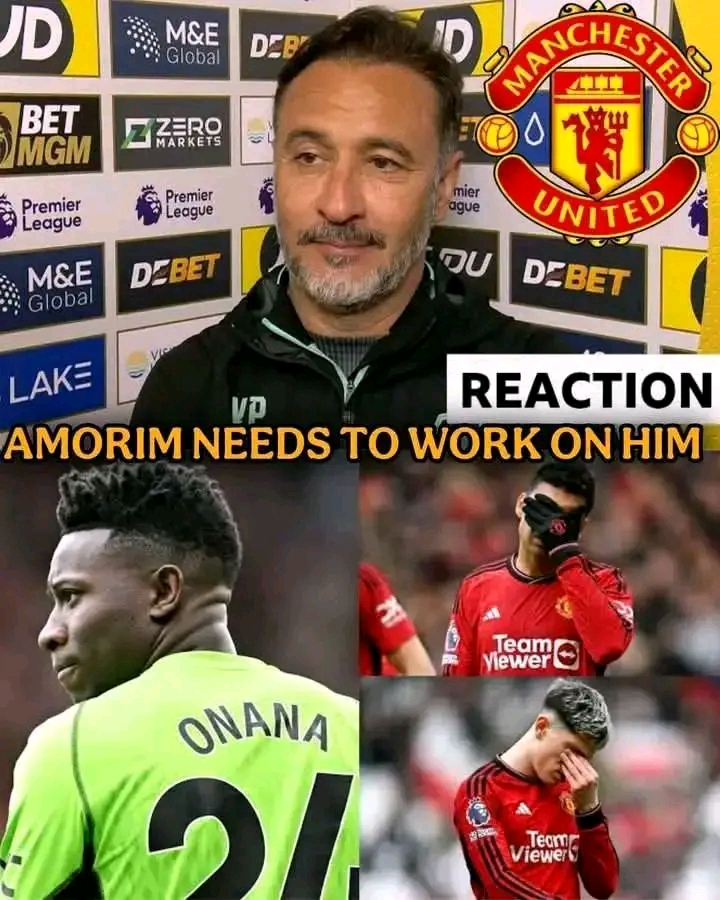The Premier League is unforgiving. It spares no club, no matter how historic, and certainly no player who fails to meet its relentless demands. Manchester United, once the gold standard in English football, now finds itself walking a perilous tightrope. And as the Red Devils struggle through one of their most turbulent seasons in recent memory, criticism has come from all corners — including an unexpected voice: Wolves manager Gary O’Neil.
In the aftermath of Manchester United’s 1-0 defeat at the hands of Wolves, O’Neil, never one to sugarcoat the truth, delivered a post-match assessment that has quickly sparked widespread debate. While many pundits and fans have been quick to lay blame at the feet of young stars like Kobbie Mainoo and Rasmus Højlund, O’Neil took a dramatically different angle.
“Everyone’s talking about the wrong players,” O’Neil said. “It’s not about the kids like Mainoo or Højlund. Amorim has a big job ahead, but if he truly wants to survive the Premier League with Manchester United next season, he must fix Patrick Dorgu.”
His words struck a nerve — not just because they were unexpected, but because they exposed a blind spot in the public conversation around United’s crisis. Patrick Dorgu, a young full-back who arrived at the club with significant promise, has largely flown under the radar. But for O’Neil, Dorgu is a symptom of a deeper problem: players being carried by the system rather than elevating it.
“Dorgu doesn’t look like a player ready for this level,” O’Neil continued. “The Premier League is brutal. You don’t get time to settle. You either adapt or your team suffers. Right now, Dorgu is costing them.”
Rúben Amorim, the man tasked with rebuilding Manchester United, is already facing immense scrutiny. Touted as one of Europe’s most promising young coaches, he now finds himself in the hot seat of a club that has become a graveyard for reputations. And according to O’Neil, one of Amorim’s first and most urgent tasks should be turning Dorgu into a reliable performer — or moving on from him.
“This isn’t just advice — it’s survival,” O’Neil warned. “Fixing Dorgu’s performances could be the difference between top ten and relegation. That’s how serious it is.”
While O’Neil’s comments might seem harsh, they reflect the harsh realities of managing in England’s top flight. There’s little room for patience, especially at a club like Manchester United, where every dropped point becomes a media storm and every underwhelming performance is dissected endlessly.
Patrick Dorgu, still early in his Premier League journey, has shown flashes of potential. But flashes are not enough. At a club desperate for consistency and leadership from the back, his positional lapses and timid attacking runs have left supporters frustrated and opposing teams exploiting his flank.
Fans have started voicing their concerns online. “We signed Dorgu expecting dynamism and maturity,” one supporter posted on Reddit. “Instead, we’ve seen hesitancy, fear, and a lack of impact in both directions. He needs to step up — fast.”
More importantly, Dorgu’s performances are beginning to affect the morale of the entire defensive unit. Without stability at full-back, center-backs are forced to overcompensate, while wide midfielders are being dragged deeper to cover for his vulnerabilities — disrupting the overall shape and balance of the team.
O’Neil’s comments also highlight a worrying trend at Manchester United: promising signings who simply don’t develop. From Diogo Dalot to Aaron Wan-Bissaka, the club has spent years trying to solve the full-back puzzle. If Dorgu becomes another name on the long list of failed projects, it could set the team back even further.
There’s also the psychological factor to consider. Being singled out, even indirectly, by a rival manager could either shatter Dorgu’s confidence or ignite a fire within him to prove everyone wrong. How Amorim handles this moment may be crucial — not just for Dorgu, but for the cohesion of his squad.
Amorim, who has built a reputation for improving young players and instilling a fearless mentality, now faces a defining test. Can he take a fragile yet talented player and mold him into someone who thrives under pressure? Can he reinforce belief while correcting glaring weaknesses?
The coming weeks will be critical. With fixtures piling up and little margin for error, Dorgu will either rise to the occasion or be phased out. And if O’Neil is right, the stakes are higher than anyone at Old Trafford is willing to admit.
It’s not just about Patrick Dorgu. It’s about what he represents — the fine line between potential and liability, between top-flight survival and collapse. Amorim’s challenge is enormous, but as O’Neil said, this particular issue might be the key to saving United’s season.
So while headlines may still focus on Højlund’s goal drought or Mainoo’s development, Gary O’Neil’s warning serves as a reminder that sometimes, it’s the unnoticed cracks that bring down the structure. If Manchester United don’t address theirs soon — starting with Dorgu — the cost may be far greater than another mid-table finish.


